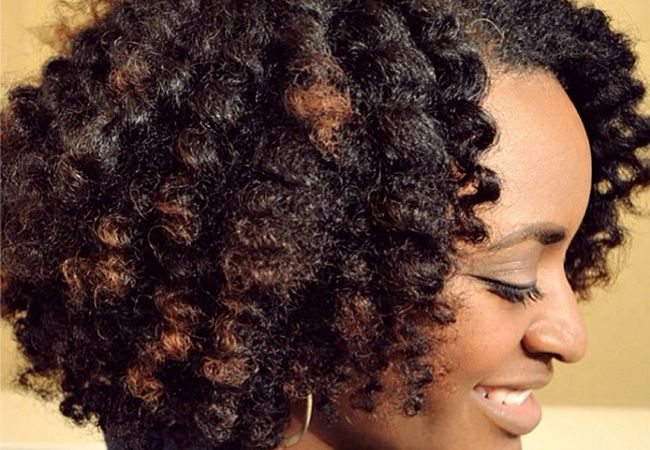WRITTEN BY DRWALKERWELLNESS VIA CURLYNIKKI.COM
PHOTO COURTESY OF SUMETRAREED
I recently modified my hair care regimen and the results blew my mind. There was an incredible softness to my hair that I had never really experienced. My hair is not usually soft at all. So you understand my delight. And all from adding in one, relatively inexpensive product. And what was it?
Glycerin.
Given all of the rules, regulations and restrictions of natural hair care, if you’re one of those women who has been taught and believes that glycerin dries out your hair and makes it hard then you probably should stop reading this article. Or maybe you should continue – to discover that truth, that is.
If your hair is incredibly dry and brittle then you’ll definitely want to keep reading.
I’ll never really understand why anti-glycerin campaigns are common among some naturals. You’ll read the blogs and view the videos of some women who state that glycerin shouldn’t be used or to look for products that are glycerin free and all sorts of “interesting” information.
And while I completely understand that each person’s hair is different and requires specific types of ingredients and products to look and feel it’s best, all hair types have one specific requirement that is a foundational requirement to looking and feeling its best:
Moisture.
If you hair is not “moist” then it’s dry, brittle, breaking, flaking. You name it, your hair experiences it when it’s not properly hydrated.
Humectants
A key set of ingredients in getting your hair to be moisturized is to humectants.
Humectants are used in hair and skin care products to promote moisture retention. They have the wonderful ability to attract water from the atmosphere. Many different molecules have the ability to be effective humectants and how well they do this depends on how many water-loving sites they contain for hydrogen bonding with water molecules. The strength of this bonding between the humectants and water improves moisture retention by slowing down water loss due to evaporation. Because of their water-binding abilities, humectants are ideal for dry, thirsty hair. That was so nice, I’ll state it twice.
Because of their water-binding abilities, humectants are ideal for dry, thirsty hair.
Let’s go a bit deeper. You know I’m all about the “why” so you’ll develop an understanding of the principles I’m discussing.
Thermodynamics & Your Hair
Now for the scienc-y stuff so bear with me. This will only take a minute.
In Tonya McKays’ article The Effects of Relative Humidity on Hair and Humectants, she points out that the laws of thermodynamics have a daily influence on our hair.
Thermodynamics is the study of energy. Energy exists in many forms such as heat, light, chemical energy and electrical energy. Everything in nature is always trying to reach a state of equilibrium or point of balance. What this means is that molecules that are highly concentrated in one area will typically move to an area where they are less concentrated until the concentration is equal for both areas. This is called diffusion. Diffusion occurs in substances that are solids, liquids or gases. You can demonstrate diffusion easily yourself. Fill a glass with water and add a few drops of ink or dye to the water carefully. The colour will sink to the bottom initially because it’s denser than the water. However over time, if left undisturbed, the ink at the bottom of the glass will spread upwards from where it’s more concentrated (at the bottom”> to where it’s less concentrated (at the top”>. Eventually all of the water in the glass will be the same shade. This is the point where there are no more differences in the concentration of molecules.
Why is this important? Because when it comes to hair, this same law of molecules trying to reach a state of equilibrium or balance applies. And the molecules we’re most concerned with are water molecules.
Humidity & Dry Hair
Humidity is the amount of water vapor in the air. Dry hair usually doesn’t contain a lot of water. When it’s exposed to a very humid environment the hair will eventually become saturated with water molecules as water moves from an area of higher concentration (the humid air”>, to an area of lower concentration (the hair”>. Textured hair is more susceptible to this because it is more porous than straight hair. On the one hand this is good. The hair is super moisturized. On the other hand once the hair is exposed to high humidity environments the cortex can swell causing cuticle scales on the hair shaft to lift contributing to what we experience as frizz.
So what happens in dry, cold conditions? Dry air typically contains little to no water vapor, or has a low relative humidity. Hair that is exposed to this type of air will tend to lose water and moisture to the atmosphere as water moves down its concentration gradient from more concentrated (the hair”> to less concentrated (the air”>. The resulting hair is dry, brittle hair which can be prone to frizz, split ends and breaking.
Humectants can be a curly girl’s best friend or worst enemy depending on the situation so you need to know when and how to use them. The most important influence of how humectants will behave in your hair is the climate.

